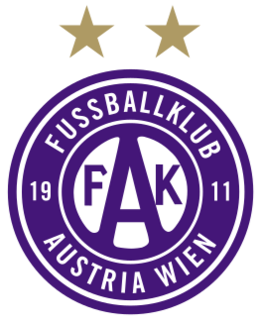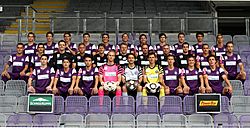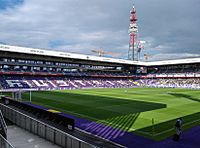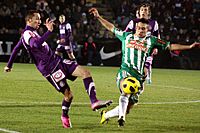FK Austria Wien facts for kids
 |
||||
| Full name | Fußballklub Austria Wien AG | |||
|---|---|---|---|---|
| Nickname(s) | Die Veilchen (The Violets) | |||
| Founded | 15 March 1911 | |||
| Ground | Generali Arena | |||
| Capacity | 17,565 | |||
| Chairman | Kurt Gollowitzer | |||
| Head coach | Stephan Helm | |||
| League | Austrian Bundesliga | |||
| 2024–25 | Austrian Bundesliga, 3rd of 12 | |||
|
||||
Fußballklub Austria Wien AG, often called Austria Wien or Austria Vienna, is a professional football club from Vienna, the capital city of Austria. It is one of the most successful football clubs in Austria. The team has won more trophies than any other Austrian club in the top league. They have won the Austrian Football Bundesliga 24 times and the Austrian Cup 27 times. Austria Wien has also won the Austrian Supercup six times.
The club reached the final of the UEFA Cup Winners' Cup in 1978. The very next season, they made it to the semi-finals of the European Cup. Austria Wien plays its home games at the Franz Horr Stadium, which is also known as the Generali Arena. Like their main rivals, Austria Wien has never been moved down to a lower league.
Contents
Club History
Austria Wien started as a club called Wiener Cricketer on October 20, 1910. In December of the same year, they changed their name to Wiener Amateur-SV. On November 28, 1926, the club officially became Fußballklub Austria Wien.
Early Success and Challenges
The team won its first championship title in 1924. When the club changed its name to Austria Wien in 1926, the players became professionals. They won their second league title that same year.
The 1930s were a very successful time for Austria Wien. They won the Mitropa Cup twice, in 1933 and 1936. This was a big tournament for champions in Central Europe. A famous player from that time was Matthias Sindelar. Many people consider him the greatest Austrian footballer ever.
The club faced difficulties when Austria was taken over by Nazi Germany in 1938. Austria Wien was sometimes called a "Jewish club." Many Jewish players and staff had to leave or were harmed. Sindelar himself died in 1939 under mysterious circumstances. He had refused to play for the combined Germany–Austria national team. The club was forced to change its name briefly to Sportclub Ostmark Wien in 1938, but they quickly changed it back to Austria Wien.
After World War II
Austria Wien won its first league title in 23 years in 1949. They won it again the next year and a fifth title in 1953. The club then won three titles in a row in 1961, 1962, and 1963. A former player, Ernst Ocwirk, later coached the team to win the Bundesliga in 1969 and 1970.
From 1973 to 1977, Austria Wien teamed up with another club, Wiener AC. They played as FK Austria WAC Wien. After this, Austria Wien went back to its original name. In the 1970s, the club became very strong again. They won eight league titles in eleven seasons, from 1975–76 to 1985–86.
In 1978, Austria Wien reached the final of the UEFA Cup Winners' Cup. They lost to a Belgian team, Anderlecht. The next season, they made it to the semi-finals of the European Cup. In 1982–83, they reached the semi-finals of the Cup Winners' Cup again. Famous players from this time included Herbert Prohaska and Toni Polster.
Recent Club History
In the early 1990s, Austria Wien had another great period. They won the Bundesliga three times in a row from 1991 to 1993. They also won the Austrian Cup three times and the Austrian Supercup four times. However, the club faced money problems in the late 1990s. This meant they had to sell some of their best players.
In 1999, a billionaire named Frank Stronach took over the club. He invested a lot of money, and Austria Wien won the Bundesliga again in 2002–03. In 2004–05, Austria Wien reached the quarter-finals of the UEFA Cup. In 2005–06, they won both the Bundesliga and the Austrian Cup.
After Stronach left in 2005, the club had a smaller budget and sold many key players. Despite this, they still won the Austrian Cup in 2007. In 2008, the club went back to its original name, FK Austria Wien, without any sponsor names. In the 2012–13 season, Austria Wien won its 24th league title.
In August 2013, Austria Wien made it to the UEFA Champions League group stage for the first time. They played against strong teams like Porto, Atlético Madrid, and Zenit Saint Petersburg. They finished last in their group, but they did have a big 4–1 win against Zenit.
Home Stadium
Austria Wien plays its home matches at the Franz Horr Stadium. This stadium can hold 17,000 fans. Since 2010, it has been called the Generali Arena because of a sponsorship deal.
The stadium was first built in 1925. Austria Wien started playing there in 1973. It was later named after Franz Horr, a chairman of the Viennese Football Association. The stadium has been updated and expanded several times over the years, most recently in 2008.
Club Rivalries
Austria Wien has a big rivalry with Rapid Wien. This match is known as the Vienna derby. Both clubs are very popular and successful in Austria. They are the only two Austrian clubs that have never been moved down to a lower league.
Historically, these two clubs represented different parts of Viennese society. Austria Wien was seen as a club for the middle class and intellectuals. Rapid traditionally had support from the working class. The first league match between them was on September 8, 1911, which Rapid won 4–1. This derby is one of the most played football rivalries in Europe.
Club Achievements
Austria Wien has won many titles throughout its history. Here are some of their main achievements:
| Type | Competition | Titles | Seasons |
|---|---|---|---|
| International | Mitropa Cup | 2 | 1933,
1936 |
| Domestic | Austrian Bundesliga | 24 |
1923–24, 1925–26, 1948–49, 1949–50, 1952–53, 1960–61, 1961–62, 1962–63, 1968–69, 1969–70 |
| Austrian Cup | 27 |
1920–21, 1923–24, 1924–25, 1925–26, 1932–33, 1934–35, 1935–36, 1947–48, 1948–49, 1959–60, 1961–62, 1962–63, 1966–67, 1970–71, 1973–74, 1976–77, 1979–80, 1981–82, 1985–86, 1989–90, 1991–92, 1993–94, 2002–03, 2004–05, 2005–06, 2006–07, 2008–09 |
|
| Austrian Supercup | 6 |
1990, 1991, 1992, 1993, 2003, 2004 |
- record
Other Titles
- Wiener Cup (2)
-
- Winners: 1948, 1949
European and Intercontinental Competitions
- Jeunesse et des Etudiants de Jeux Sportif (1)
-
- Champions: 1959
-
- Runners-up: 1978
- Copa Rio
-
- Semi-finals (2): 1951, 1952
Current Team Players
|
|
Players on Loan
Some players from Austria Wien are currently playing for other teams for a set period:
|
|
Austria Wien II / Young Violets
This is the reserve team, often called the Young Violets, where younger players develop their skills.
|
|
Club Leadership
Here are some of the key people who help run FK Austria Wien:
See also
 In Spanish: FK Austria Viena para niños
In Spanish: FK Austria Viena para niños
- The Football Club Social Alliance
 | Precious Adams |
 | Lauren Anderson |
 | Janet Collins |





